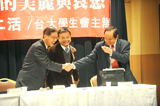See also:
馬英九要與民進黨辯ECFA 不再給民進黨"指鹿為馬"機會
and 大學生邀辯ECFA 吳敦義沒空.NO DEBATE: The government declined to let students ask an official about the pros and cons of an ECFA. It only wanted to give its own description of the pact’s benefits
By Loa Iok-sin Taipei Times
STAFF REPORTER Sunday, Dec 27, 2009, Page 3
 |
Minister of Economic Affairs Shih Yen-shiang, left, and Taiwan Thinktank chairman Chen Po-chih shake hands after a debate on whether Taiwan should sign an economic cooperation framework agreement with China.
PHOTO: LO PEI-DER, TAIPEI TIMES
|
The National Taiwan University Student Association (NTUSA) yesterday said it was disappointed that Premier Wu Den-yih (吳敦義) declined a challenge from students to debate whether Taiwan should sign an economic cooperation framework agreement (ECFA) with China, instead asking Minister of Economic Affairs Shih Yen-shiang (施顏祥) to “explain” the ECFA to students.
Student associations from National Taiwan University (NTU), National Chengchi University and National Taiwan Normal University invited the premier to debate on whether signing an ECFA with China would benefit Taiwan, especially in the areas of employment opportunities for youth and the development of human rights. However, Wu did not accept the invitation.
‘REGRET’
“We regret that Wu, an NTU alumnus, declined to accept our challenge to a debate on an ECFA,” NTUSA spokeswoman Jane Tang (唐家婕) told reporters outside the forum yesterday. “Wu said that the Minister of Economic Affairs may be more knowledgeable on the issue, but we think an ECFA is not only about economic issues and Wu should be the person who knows most because he is the head of the government.”
Tang said the group had tried to invite heads of several government agencies, but only Shih agreed to take part.
Although the Minister of Economic Affairs agreed to come, the ministry said it would prefer to simply describe what an ECFA was, what its impacts would be, and what may happen if Taiwan did or did not sign such an agreement with China, Tang said.
“It’s very unfortunate,” she said.
PRESENTATION
In a 30-minute presentation, Shih said that with an increasing number of countries — especially in East Asia — forming trade blocs by signing free-trade agreements (FTA) and regional-trade agreements, Taiwan risked being left out of the global trade system.
“We should sign am ECFA — a type of FTA — with China because it’s our biggest trading partner,” Shih told the forum. “Signing an ECFA with China would help Taiwanese businesses grab a bigger share of the Chinese market; it would also enhance the chance of signing FTAs with other countries in the future.”
Shih said that an ECFA, like other FTAs, would be submitted to legislative review before going into force.
NEGATIVE
He said that an ECFA with China may have a negative impact on some Taiwanese industries, but added that the impact could be overcome if Taiwan continues to develop technology.
However, Taiwan Thinktank chairman Chen Po-chih (陳博志), an economist who also attended the forum, disagreed.
“The minister stressed the benefits too much, but avoided talking in more detail about the negative impacts of an ECFA,” Chen said. “He said that Taiwan could overcome the challenges [after signing an ECFA] via technological innovations, but he didn’t say what the government would do to help.”
Chen said he was worried that once the trade barrier is lifted, Taiwanese businesses would move to China to cut production costs instead of investing in technological innovation.
‘NOT ALLOWED’
“Besides, Chinese officials clearly said on April 14 that they would not allow Taiwan to sign FTAs with other countries — maybe we should include a clause in an ECFA saying that it would only become effective once Taiwanese FTAs with the US, Japan, or Europe become effective,” he said.
Asked by reporters to respond to Chen’s comments, Shih only said the government was working to sign FTAs with other countries.




